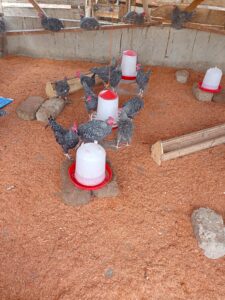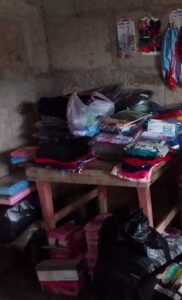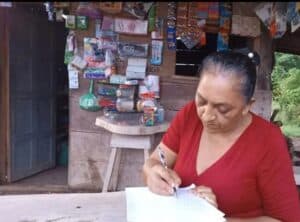My Personal Growth Thanks to Friendly Hands
 Josefina is 48 years old with a very low level of schooling, she barely passed the first grade of primary school. She currently lives in the Cruz Verde community with her 7 children (3 girls and 4 boys). Her three youngest children are still enrolled in primary school, and her dream is that her children can continue their studies so that they can be prepared since she and her older children did not have the same opportunities because the schools were too far away from where they lived.
Josefina is 48 years old with a very low level of schooling, she barely passed the first grade of primary school. She currently lives in the Cruz Verde community with her 7 children (3 girls and 4 boys). Her three youngest children are still enrolled in primary school, and her dream is that her children can continue their studies so that they can be prepared since she and her older children did not have the same opportunities because the schools were too far away from where they lived.
Josefina was born in Santo Thomas, Chontales. At the age of 5, her parents decided to emigrate to a place called El Porvenir, municipality of Kukra Hill, El Rama. At a very young age, she learned how to work in the fields with her parents, and when she was at home, she supported her mother in taking care of their animals, being chickens, pigs, ducks and turkeys. Once they were ready to sell, her mother took the animals to the nearest community, and from the sale, they obtained enough money to meet the needs of the home. From this practice, the family survived by working in the fields and raising animals for food and financial gains.
At the age of 14, Josefina began to start a small business. She asked her father for financial support and he gave her money to buy a baby turkey. Once it grew up, she took town to be sold. With the proceeds from this sale, she bought bags of popsicles (candy) to take them to be sell in her community. In this way she kept growing her savings by buying and selling perishable products necessary in her community with a minimum profit. This idea was of great help to her, because in addition to obtaining her personal money, she had an activity to do and thus complement the need for studies, since, as previously mentioned, her school was a long way from her home.
At the age of 18, Josefina married and moved with her husband. She invested the money from her business and started a new life on her husband’s parents’ farm. This time changing her strategy, she decided to buy two calves and reproduce while she and her husband worked the land.
After many years of being married, the marriage deteriorated and the couple decided to separate. Josefina, since she had her money, decided this time to completely change her quality of life, changing even the place where she was living, moving from Kukra Hill, Rama to Cruz Verde, Rio San Juan. Although it was not a great capital, she was able to buy a small house and a plot of land where her and her older children worked hard to get ahead. Time passed and now her older daughters are married and she continues to struggle with her young children, always working in agriculture. Above all, she decided to send her children to school so that they can have a better future than her and her older children.
Being part of this new community of Cruz Verde, Josefina, along with her children, began new friendly relationships with people who reached out to help them in any way possible. Soon she became a member of a church which was where she learned of Self–Help International. She tells us that although at first she did not want to participate because she did not believe in these types of support, one day she finally decided to participate in one of the meetings that taught the technique of the Women’s Empowerment Program of this organization and it caught her a lot of her attention because of all the activities, training and strategies that this program offered to women like her, so she decided to take the next step in being one of the pilot women to implement the double row planting technique and use of the INTA-Nutrader maize promoted by the program. After having obtained all the training, and implemented a demonstration plot of the double row using that improved maize and seeing the results, she wants to be part of the program.
After having passed all the processes and requirements requested by the program to be fulfilled, Josefina received her first loan to sow 1.7 acres of corn implementing the double row technique and using the Inta-Nutrader Certified seed. The results obtained were excellent and she sold the corn. From this sale she was able to pay her financing and with the rest of the money she improved some needs to her house such as fixing the kitchen roof, because it got wet every time there was rain. Above everything else, she also bought all the school supplies for his 3 youngest children to avoid them missing any studies. Josefina’s eldest daughters saw how their mother surpassed herself and they also decided to participate in the women’s empowerment program, and in the same way, they have received training benefits, developing new skills to improve their quality of life.

Josefina with her chickens
The second loan Josefina requested for the same “Corn planting” always using the double row technique, this time her earnings were higher since she had more experience, and like the first time, she paid her loan to Self-Help International and with the rest of the money she was able build a bathroom (a shelter closed with half concrete and half wood) for more privacy while taking shower. She also also built a chicken shelter to raise and farm chickens. Then she applied for the third loan, this time she wanted the money to plant vegetables (carrots and potatoes) but according to the experts, the land was not adequate because it has many pests and lack of conditions, so at the end Josefina decided to continue the process of her chicken project and so she bought more baby chickens and gave her chicken shelter a better conditions, and now she has a profitable business that she has on her own home and that it can be managed by her with the support of her children. The way she is implementing this project is by having cycle chickens, (buying baby chicks every certain time) having different ages and sizes of chickens, so that she can always have enough chickens to cover the needs of the people in her community.
Another great achievement that Josefina has seen is that she with the support of her children, sows and harvests the corn, using part of it for household consumption and the rest she uses to prepare the food for her chickens, everything with organic inputs, and in this way she can avoid purchasing chicken feed from distributors which are more expensive, plus she has to travel to other communities to obtain it.
Josefina tells us that, thank God, everyone is doing well and she is very grateful to all those who have reached out to support her in continuing to fight for her own good and her children. She also thanks the Women’s Empowerment Program for all the training and skills they have given her and her daughters to continue their lives in a more dignified way, and says she is willing to support other women like her who want to improve themselves by learning something new to become a better person.




